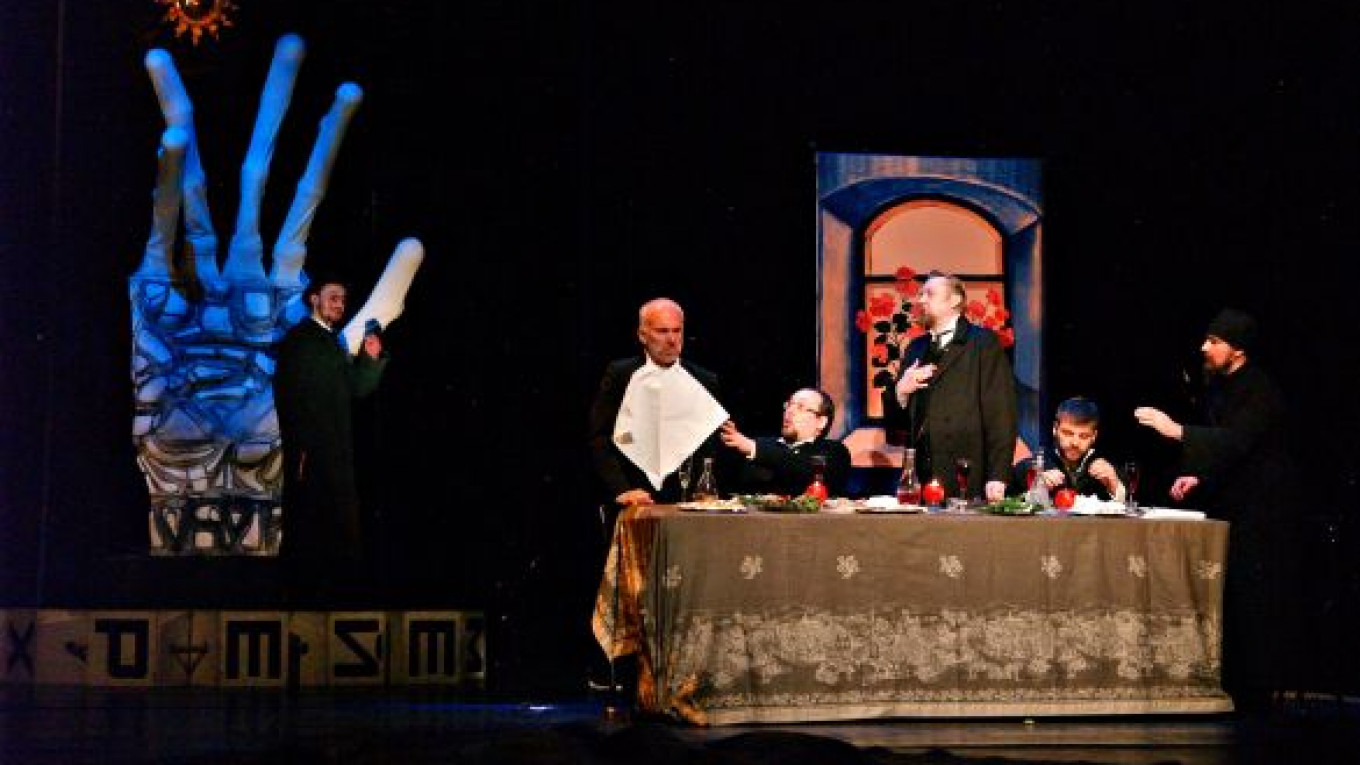ST. PETERSBURG — The Steppenwolf Awards, co-founded by the beleaguered Moscow-based music critic and producer Artyom Troitsky with the aim of promoting talented, innovative and independent music, will be held Thursday in St. Petersburg.
More than a dozen artists, including Yury Shevchuk of DDT, Moscow-based rapper Noize MC, Sergei Mikhalok of Belarus-based Lyapis Trubetskoi and American guitarist, vocalist and composer of Latin music Omar Torrez, will perform at the show, to be hosted by Troitsky himself.
The Steppenwolf Awards were established in Moscow in 2008, originally as part of the Moscow Book Fair, and for the past three years have been held at Moscow's Central House of Artists.
"There are a number of music awards in the country, but all of them are corporate ones. On the one hand, they are organized by music television channels or radio stations," Troitsky said. "On the other hand, everybody knows only too well how much these awards are manipulated or, to put it simply, are corrupt.
"My friends and I wanted there to be one award that is not corporate or biased, and not given for popularity or exposure — not for the number of copies sold or radio plays, but for real achievements in music or spheres connected to music."
For the Steppenwolf Awards, nominees are put forward by a team of about 20 journalists and music industry professionals, while the winners are voted in by a jury. Awards are given for 16 categories, ranging from "Best Song" to "Something Remarkable."
Troitsky said the awards do not reflect his personal music taste and are simply the choice of music experts.
"There will be alternative rock, electronic music and some rap at the event," he said. "This year, I would say the awards are even less mainstream than usual. The main figures will be people like Mujuice, Zhenya Lyubich, Zorge, YestYestYest and Kira Lao.
"Out of mainstream artists, there will be Lyapis Trubetskoi, Vasya Oblomov and Noize MC, if he can be considered mainstream. I even heard that they were planning to ban Noize MC in St. Petersburg because some commission has found references to drugs in his songs."
Russian music has made dramatic progress since the awards were established, Troitsky said.
"I think the music scene has improved greatly during the past two or three years," he said.
"On my part, it would be too brash and immodest to say that the Steppenwolf Awards have had any considerable influence on it, although I can't rule out that to a certain extent they have. At least I know that these awards are respected by worthwhile musicians.
"But the main thing is that everything has become more interesting here than it was at least a couple of years ago. If you recall, in 2007, for example, there was no Noize MC, no Barto, no extreme rap; there was no huge number of English-language groups like Momoney, Scofferlane and so on.
"Nor were there any interesting provincial groups like Kira Lao, 4 Positions of Bruno, Ptitsu Yem, bands from Novgorod, Kaluga and so on. All this has emerged in the last few years. Or take St. Petersburg's hippest girls like Nina Karlsson, Zhenya Lyubich, Galya Chikiss and others — they've all emerged in the last few years."
"I would say that there has been a total revolution in quality Russian music as a whole during the few past years," he added.
The quality and diversity of this music have also increased very noticeably.
"I don't even want to compare this music to what is shown on all sorts of television channels. It's simply a different universe. There is [pop singer] Nikolai Baskov there, and there is 4 Positions of Bruno here. The abyss between these two poles is wider than that between [Prime Minister Vladimir] Putin and [opposition politician Eduard] Limonov."
Ignored for the most part by the Russian media, the music with which the Steppenwolf Awards deal exists mostly in underground clubs, small festivals and on the Internet. "This music mostly lives in three dimensions," Troitsky said.
"The main dimension and core is the Internet, the second is live concerts, and the third is discs, because this music comes out on discs. Plus there's a small number of niche television stations such as A-One."
According to Troitsky, these outlets are more up-to-date than the traditional Russian mass media.
"All that Russian pop crap exists in the media, which is slowly — like federal television channels — or quickly — like FM radio — sinking to the bottom."
Troitsky promotes Russian music he finds interesting on his Voskhod label, a subsidiary of the Soyuz recording company.
Although some of the bands released on his label are also nominated for Steppenwolf awards, that is not intentional, according to Troitsky.
"To a certain extent, some things overlap, but I swear it's only by accident," he said.
A Message from The Moscow Times:
Dear readers,
We are facing unprecedented challenges. Russia's Prosecutor General's Office has designated The Moscow Times as an "undesirable" organization, criminalizing our work and putting our staff at risk of prosecution. This follows our earlier unjust labeling as a "foreign agent."
These actions are direct attempts to silence independent journalism in Russia. The authorities claim our work "discredits the decisions of the Russian leadership." We see things differently: we strive to provide accurate, unbiased reporting on Russia.
We, the journalists of The Moscow Times, refuse to be silenced. But to continue our work, we need your help.
Your support, no matter how small, makes a world of difference. If you can, please support us monthly starting from just $2. It's quick to set up, and every contribution makes a significant impact.
By supporting The Moscow Times, you're defending open, independent journalism in the face of repression. Thank you for standing with us.
Remind me later.






